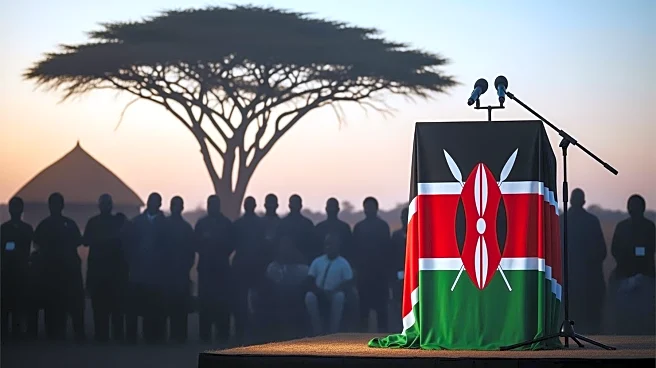What's Happening?
Former Kenyan Prime Minister Raila Odinga has died at the age of 80 while receiving medical treatment in India. Odinga, a prominent figure in Kenyan politics, suffered a cardiac arrest during a morning walk and was declared dead at Devamatha Hospital.
His death has prompted a seven-day period of mourning in Kenya, with President William Ruto paying tribute to Odinga as a 'beacon of courage' and 'father of our democracy.' Odinga was known for his role in shaping Kenya's multi-party democracy and his repeated presidential bids, which often led to disputes over election results. His political career was marked by his ability to mobilize supporters and his advocacy for democratic freedoms.
Why It's Important?
Raila Odinga's death marks the end of an era in Kenyan politics, as he was a key figure in the country's transition to multi-party democracy. His influence extended beyond Kenya, with leaders from across Africa and India expressing condolences. Odinga's legacy includes his role in challenging election results and advocating for electoral reforms, which have had lasting impacts on Kenya's political landscape. His passing leaves a void in the opposition, raising questions about who will continue his work and maintain his political influence. The mourning period and state funeral reflect his significance in Kenyan society and the respect he garnered internationally.
What's Next?
A delegation led by Kenya's Foreign Affairs Minister Musalia Mudavadi and Odinga's widow is expected to travel to India to oversee the arrangements for repatriating his body. The state funeral with full military honors will be a significant event, likely attended by numerous dignitaries and political figures. Odinga's supporters are expected to continue mourning, particularly in his strongholds in western Kenya and parts of Nairobi. The political landscape in Kenya may shift as leaders and parties adjust to the absence of Odinga's influence, potentially leading to new alliances and strategies within the opposition.
Beyond the Headlines
Odinga's death may prompt reflections on the ethical and cultural dimensions of his political career, including his role in advocating for human rights and democratic freedoms. His history as a political prisoner and his resistance against dictatorship highlight the struggles for political reform in Kenya. The mourning period may also serve as a time for national unity, as citizens and leaders come together to honor his legacy. Long-term, Odinga's passing could influence the direction of political movements in Kenya, as new leaders emerge to fill the void left by his absence.















